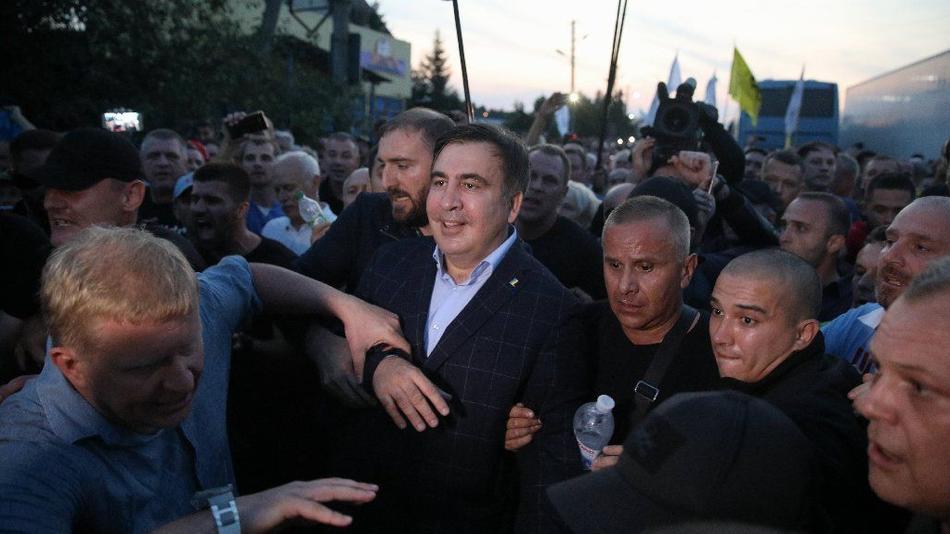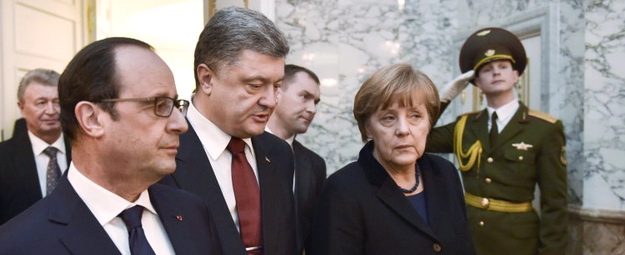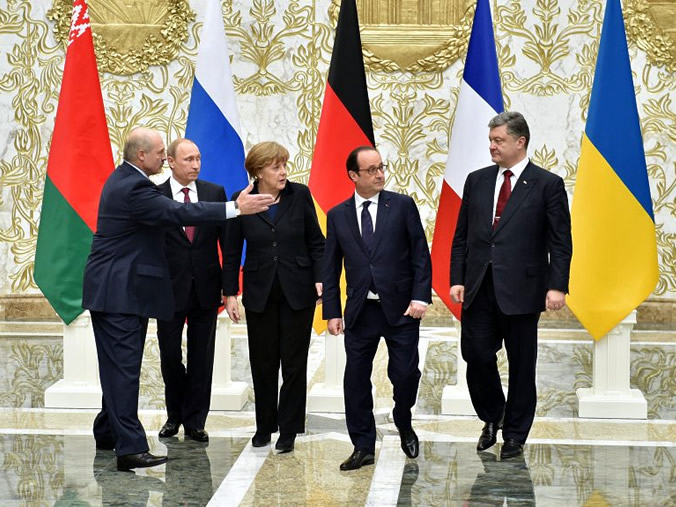New players are clustering around Saakashvili and this does not bode well for Ukraine.
Yesterday’s history with the breach of the border by supporters of the former Georgian president Mikheil Saakashvili is but another chapter in the story about the Ukrainian politician who was so unhappy with the scope of his powers and opportunities at the time of his election as head of state that he decided to invite a hyperboloid into the country — an effective device capable of removing his supporters, followers, and associates from the scene.
Petro Poroshenko was elected head of state under conditions that were extremely unfavorable for the country but extremely favorable for him. He became president in the first round of voting, a success only matched by Leonid Kravchuk 23 years earlier. Poroshenko, a politician without a party and without an obvious political platform, was supported not only by his friends from the business world but also by the recent allies of Yulia Tymoshenko, who even tried to persuade their ambitious leader not to run for the post of head of state. On Poroshenko’s side, an unexpected oligarchic consensus formed — from Akhmetov to Firtash and Kolomoisky. He also had unprecedented international support simply because the West urgently needed a new legitimate head of the Ukrainian state with whom they could try to control a resurgent Putin.
All this was not enough for Poroshenko. The new president, who had been formed under the conditions of the Kuchma system and who had worked in government under both Yushchenko and Yanukovych, was convinced that a balance of interests was the worst thing that could be imagined in the presidential post. Of the three models that he knew by heart — Kuchma, the undisputed president-arbiter, Yushchenko, who barely fended off opponents, and Yanukovych, who strangled everyone and everything –he probably viewed Kuchma’s version of the classic oligarchic republic as ideal. The question, however, was how to return to the political past after Maidan.
And the new president invented the hyperboloid. The device appeared in the form of his former school chum from a prestigious Soviet university — the former Georgian President Mikheil Saakashvili.
When he was invited to Ukraine, Saakashvili was no longer a political figure but a historical one. His plans for transforming Georgia from a presidential to a parliamentary republic were only relatively successful — the parliamentary republic appeared, but Saakashvili himself was unable to assume any role in the new version and was forced to flee from his own country, leaving behind his associates in the courts and prisons. Moreover, Georgia’s president was destroyed by his own hyperboloid invention.
The Ukrainian, as well as the West’s, idea of Saakashvili’s reign was based on a brilliant propaganda campaign carried out during the years of his presidency, which, as is often the case with any propaganda, presents far from the complete truth. The hidden part of the truth was based on the fact that an important role in Saakashvili’s new state was played not only by Westerns infusions and investments but also by oligarchic money. At first, it was exchanged in Robin Hood style for freedom or even life (which, however, not all managed to save) and then willingly given in exchange for power and influence.
Ultimately, the Russian billionaire Bidzina Ivanishvili, who after the overthrow of President Eduard Shevardnadze moved to Georgia from Russia, became the government’s main sponsor. It was during the period of Ivanishvili’s growing influence that Saakashvhili completely monopolized power, taking advantage of the opportunity of get rid of opponents, of associates and other moguls. He did not even think too much about the consequences of ignoring American wishes.
But there was one thing the Georgian president did not take into account — that hyperboloids are not needed by their creators. The cautious, cunning, patient Ivanishvili quickly realized that he could rule Georgia without this capricious, selfish, unpredictable, and cruel child who was concerned only with his own reflection in the mirror. The hyperboloid decided to get rid of the monarch. And he succeeded. Saakashvili vainly shouted about the “Russian oligarch” and “Putin’s conspiracy.” Residents of the poor country that continued to live according to Soviet paternalistic rules realized that they could vote for the sponsor without intermediaries. And they chose the hyperboloid. Saakashvili’s supposed successor, Vano Merabishvili, ended up in prison and the former president found himself in exile and under investigation. Everything was over — and forever. What would you do in the place of an extremely ambitious and still youngish man who had been turned into an exile, a textbook page, a wanted offender?
Saakashvili was ready to act as a hyperboloid. We do not know exactly what Poroshenko promised him in return. Appetite, as we know, grows with eating. The first service that the former president performed for Poroshenko was to undermine the influence of the oligarch Ihor Kolomoisky, who had organized the defense of the east of the country and as a result gained the influence of a prince. The Odesa Oblast was for Kolomoisky an honorary prize, and Poroshenko took this prize away with the help not so much of Saakashvili but with the myth of Saakashvili, the reformer. The citizens, naturally, were told about the range of reforms, about limiting the influence of oligarchs and anything at all other than about strengthening the president’s power. However, if everything had ended there, if Poroshenko had sought to maintain the balance of power and if Saakashvili had concentrated on the “reforms,” there would have been no catastrophe. But could two such ambitious guys settle down — the president and his hyperboloid !
Poroshenko’s next goal was the purely classic goal of any Ukrainian president — control of the government. The head of state was not happy with the need to constantly seek a compromise with Prime Minister Arseniy Yatseniuk and his party. But it was much more difficult to undermine Yatseniuk’s reputation than the reputation of Kolomoisky, who with typical recklessness rushed into the traps that were set for him. And here the hyperboloid was useful again. Saakashvili travelled around the country, accompanied by gifted propagandists brought in from Georgia and acquired in Ukraine, and held anti-corruption forums. He exposed Yatseniuk with sound and fury, carefully bypassing Poroshenko and his closest circle. And he demanded results.
And here we come to the most interesting part — what did Saakashvili expect for his work? At the beginning of the struggle with Yatseniuk, not only did Saakashvili lose all connection with reality, but Poroshenko began to lose it as well. It is quite possible that when Saakashvili began to think that he could become the new “reformist prime minister” he counted on a Georgian version of Ukraine (or to be quite honest, a Russian Putinist one). After the “Rose Revolution,” his small populist party absorbed the respectable opposition to the rule of Shevardnadze and the new union obediently carried out the president’s orders until Ivanishvili appeared on the scene. It is quite possible that even Poroshenko himself could have assumed that, after Yatseniuk was compromised, his party would unite under the president’s banners because its deputies would have nowhere else to go. And it is possible that Ukraine’s president simply decided that a carrot in the form of the promise of prime ministership imagined by the former president of Georgia would force him to act according to conscience and not fear.
Saakashvili really could not understand what had happened and why he had been deceived. As someone who had gained political experience under conditions of the erosion, construction and degradation of an authoritarian regime in a small, poor country, he had failed to understand the logic of Ukrainian politics. He did not understand that shouting “I will lock up all of you” may be suitable for a rally of the masses but not for achieving real power. He was sure that Poroshenko had simply fooled him and had conspired with those against whom he had forced him to act. What a terrible betrayal!
From that moment, a conflict between the two former friends became only a matter of time. Saakashvili turned into Ivanishvili and the hyperboloid was ready to turn on its creator. The only thing that postponed this conflict for a while was the relocation of the former Georgian president to another world. He believed, and had convinced many in Ukraine to believe, that he could win in the parliamentary elections in Georgia and return home on a white horse. For Poroshenko and for Saakashvili, this would have been the best solution — the former president of Georgia would be vindicated and would become involved in the kind of politics he understood and the president of Ukraine would rid himself of the hyperboloid and would gain a partner in a friendly country. The problem, however, was that Saakashvili’s revenge existed only in the imagination of the former president and nowhere else. Saakashvili finally realized this fact as he was already preparing to return to the Turkish-Georgian border. He simply had no other way out than to demand his due somewhere else.
And the hyperboloid turned around. Everything that we have observed after this reversal is only the struggle of hurt pride. According to Poroshenko, Saakashvili is a scoundrel who forgets favors. He, Poroshenko, gave him another chance, cleaned him up, forced his own citizens to believe in his non-existent abilities. And what did this twerp do instead of working on the president’s team? He undermined the president’s authority, damaged Poroshenko’s reputation, conspired with his enemies and rivals. What terrible ingratitude!
According to Saakashvili, Poroshenko is a scoundrel who forgets favors. He, Saakashvili, gave him the chance to become a real president similar to himself — to Misha the indisputable, who did not need to pay attention to anyone. He rid him of Kolomoisky, of Yatseniuk. He helped him get rid of others and convinced citizens to believe the president was practically the main fighter against corruption. And what did Poroshenko do instead of rewarding Saakashvili with the prime minister’s portfolio at the very least? He conspired with people Saakashvili had gotten rid of, he discussed him with his former hyperboloid Ivanishvili. What a terrible lack of gratitude!
The only problem is that the consequences of this family quarrel are affecting the prospects of a large country. First, the ambitions of the ambitious go-getters undermined the confidence of citizens in the reformers who had to initiate changes in the country under conditions of ruin, war, and the degradation of state institutions. Then the authority of the presidential institution itself was placed in doubt again. Then, Ukrainian citizenship, which is definitely more sacred than the prime minister’s portfolio, appeared to be the result of political bargains. Now they are disregarding the Ukrainian state border. And this is not even the end yet. New players are circling the hyperboloid who are trying to figure out where its switch is located. And here we have Kolomoisky, whom Saakashvili threatened to lock up, conversing with him in his Swiss hide-away as recently as yesterday. And now Tymoshenko is drawing close. Come on now Yulia, push, what’s up!
I do not intend to appeal to Mikheil Saakashvili simply because, first of all, I do not consider him a Ukrainian politician but a Georgian one, and because I am convinced that his place is in the history textbooks of Georgia and not on the political scene of Ukraine. And also because I know that no one and nothing will penetrate the armor of this person’s childish ambition and adolescent love of power. If a person has not grown up by the age of 50, he will never grow up. I don’t know how to discuss politics with children.
But I still want to appeal to Petro Poroshenko — not because his ambition is weaker but because he is the president of my country and he is still an adult. This entire scandal that we are observing, Mr. Poroshenko, is primarily the result of your behavior, your unwillingness to take into account you own mistakes and those of others, your approach to power as a system of personal control over everything. Under Ukrainian conditions, this view can only lead to another collapse — your personal collapse and the collapse of the state.
It is time to stop dealing with crooks, Mr. President. It is time to stop thinking of how to increase your control.
It is time to think about the country.




